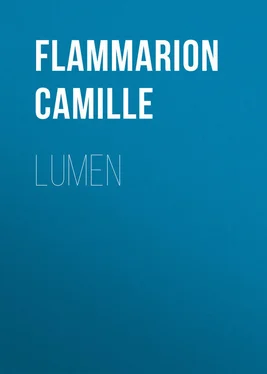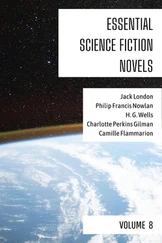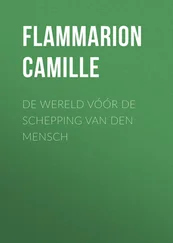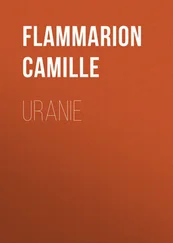Camille Flammarion - Lumen
Здесь есть возможность читать онлайн «Camille Flammarion - Lumen» — ознакомительный отрывок электронной книги совершенно бесплатно, а после прочтения отрывка купить полную версию. В некоторых случаях можно слушать аудио, скачать через торрент в формате fb2 и присутствует краткое содержание. Жанр: foreign_antique, foreign_prose, foreign_sf, на английском языке. Описание произведения, (предисловие) а так же отзывы посетителей доступны на портале библиотеки ЛибКат.
- Название:Lumen
- Автор:
- Жанр:
- Год:неизвестен
- ISBN:нет данных
- Рейтинг книги:4 / 5. Голосов: 1
-
Избранное:Добавить в избранное
- Отзывы:
-
Ваша оценка:
- 80
- 1
- 2
- 3
- 4
- 5
Lumen: краткое содержание, описание и аннотация
Предлагаем к чтению аннотацию, описание, краткое содержание или предисловие (зависит от того, что написал сам автор книги «Lumen»). Если вы не нашли необходимую информацию о книге — напишите в комментариях, мы постараемся отыскать её.
Lumen — читать онлайн ознакомительный отрывок
Ниже представлен текст книги, разбитый по страницам. Система сохранения места последней прочитанной страницы, позволяет с удобством читать онлайн бесплатно книгу «Lumen», без необходимости каждый раз заново искать на чём Вы остановились. Поставьте закладку, и сможете в любой момент перейти на страницу, на которой закончили чтение.
Интервал:
Закладка:
My attention was fixed exclusively on the little terrestrial sphere by the side of which I perceived the Moon. I soon remarked the white snow of the North Pole, the yellow triangle of Africa, and the outlines of the Ocean. Whilst my attention was concentrated on our planet, the Sun-star became eclipsed before my eyes. Then I was able to distinguish, in the midst of an expanse of azure, a brown cleft or hollow, and pursuing my investigations I discovered a town in the midst of this cleft. I had no difficulty in recognising that this continental hollow was France, and that the town was Paris. The first sign by which I recognised it was the silver ribbon of the Seine, that describes so many graceful convolutions to the west of the great town. By the use of my new optical organs I could see it in detail. At the eastern side of the city I saw the nave and towers of Notre Dame in the form of a Latin cross. The Boulevards wound round the north. To the south I recognised the gardens of the Luxembourg and the Observatory. The cupola of the Pantheon covered like a grey hood the Mount of Ste. Geneviève. To the west the grand avenue of the Champs-Élysées formed a straight line. Farther on I could distinguish the Bois de Boulogne, the environs of St. Cloud, the Wood of Meudon, Sèvres, Ville d'Avray, and Montretout.
The whole scene was lighted up by splendid sunshine; but, strange to say, the hills were covered with snow as in the month of January, whilst I had left it in October when the country was perfectly green. I was fully convinced that I was looking at Paris; but as I could not understand the exclamations of my companions, I endeavoured to ascertain more details.
My eyes were fixed with most interest upon the Observatory. It was my favourite quarter, and for forty years I had scarcely left it for more than a few months. Judge, therefore, of my surprise when I came to look more closely at it to find that the magnificent avenue of chestnuts between the Luxembourg and the Observatory was nowhere to be seen, that in its place were the gardens of convents. My indignation as an artist was aroused against these municipal misdeeds, but it was quickly suspended by still stranger feelings. I beheld a monastery in the midst of our beautiful orchard. The Boulevard St. Michel did not exist, nor did the Rue de Medici; instead I saw a confused mass of little streets, and I seemed to recognise the former Rue de l'Est and the Place St. Michel, where an ancient fountain used to supply water to the people of the faubourg, and I made out a number of narrow lanes which existed long ago. The cupolas and the two side wings of the Observatory had disappeared. By degrees, as I continued my observations, I discovered that Paris was indeed much changed. The Arc de Triomphe de l'Étoile, and all the brilliant avenues that meet there, had disappeared. There was no Boulevard de Sébastopol, no Station de l'Est, nor any other station, and no railway. The tower of St. Jaques was enclosed in a court of old houses, and the Column of Victory was reached that way. The Column of the Bastile was also absent, for I should easily have recognised the figure upon it. An equestrian statue filled the place of the Vendôme Column. The Rue Castiglione was an old green convent. The Rue de Rivoli had disappeared. The Louvre was either unfinished or partly pulled down. Between the Court of Francis I. and the Tuileries there were tumble-down old hovels. There was no obelisk in the Place de la Concorde; but I saw a moving crowd, though I was unable at first to distinguish the figures. The Madeleine and the Rue Royal were invisible. Behind the Isle of St. Louis I saw a small island. Instead of the outer Boulevards there was only an old wall, and the whole was enclosed by fortifications. In short, although I recognised the capital of France by some familiar buildings, I was aware of a marvellous metamorphosis, which had completely changed its aspect.
At first I fancied that, in place of having just come from the Earth, I must have been many years en route . As the notion of time is essentially relative, and there is nothing real or absolute in the measure of duration, having once left the Earth, I had lost all standard of measure, and I said to myself that years, centuries indeed, might have passed over my head without my perceiving it, and that the time had seemed short to me because of the great interest I had taken in my aerial voyage – a commonplace idea which shows how merely relative is our notion of time. Not having any means of assuring myself of the facts of the case, I should undoubtedly have concluded that I was separated by many centuries from the terrestrial life which was now going on before my eyes in Paris, and I imagined that I saw the period of the twentieth or twenty-first century until I penetrated more deeply into the details of the life picture and examined all its features. Eventually I succeeded in identifying the aspect of the town, and I gradually recognised the sites of the streets and of the public buildings which I had known in my early youth. The Hôtel de Ville appeared to be decorated with flags, and I could distinguish the square central dome of the Tuileries.
A little further examination recalled everything to me; and then I saw, in an old convent garden, a summer-house which made me tremble with joy. It was in that spot that I met in my youth the woman who loved me so deeply, my Sylvia, so tender and so devoted, who gave up everything to unite her life to mine. I saw the little cupola of the terrace where we loved to saunter in the evenings and to study the constellations. Oh, with what joy I greeted those promenades where we had walked, keeping step with one another, those avenues where we took refuge from the curious eyes of intruders! You can fancy how, as I looked at this summer-house, the sight of it alone was enough to assure me, absolutely and convincingly, that I had before my eyes not, as it was natural to suppose, the Paris of long after my death , but in reality the Paris of the past , old Paris of the beginning of this century or of the end of last century. But, in spite of all, you can easily imagine that I could scarcely believe my eyes. It seemed so much more natural to think that Paris had grown old and had suffered these transformations since my departure from the Earth – an interval of time absolutely unknown to me. It was so much easier to think that I beheld the city of the future. I continued my observations carefully, in order to ascertain if it was really the old Paris, now partly demolished, that I was looking at, or if, by a phenomenon still more incredible, it was another Paris, another France, another world.
II
Quærens. What an extraordinary discovery for an analytical mind like yours, dear Lumen! By what means did you satisfy yourself that your conclusions were correct?
Lumen. While I was gradually arriving at the conviction of which I have told you, the old men around me on the mountain continued their conversation. Suddenly the oldest of them, a venerable Nestor whose aspect commanded both admiration and respect, called out, in a loud and mournful voice "On your knees, my brethren; let us pray for forbearance to the universal God. That world, that nation, that city continues to revel in blood. A fresh head, that of a king this time, is about to fall." His companions seemed to understand, for they knelt down on the mountain, and prostrated their white faces to the ground. For myself, I had not yet succeeded in distinguishing men in the streets and squares of Paris, and not being able to verify the observations of these old men, I remained standing, but I pursued my examination of the scene before me carefully. "Stranger," said the old man to me, "do you blame the action of your brothers since you do not join your prayers to theirs?" "Senator," I replied, "I neither approve nor blame what I do not comprehend. Having only just arrived on this mountain, I do not know the cause of your righteous indignation." I then drew near the old man, and while his companions were rising and entering into conversation in groups, I asked him to describe the situation to me. He informed me that the order of spirits inhabiting this world are gifted by intuition with the power of seeing and apprehending events in the neighbouring worlds, and that they each possess a sort of magnetic relation with the stars and systems around them. These neighbour-worlds, or stars, are twelve or fifteen in number. Outside that limit the perceptions become confused. They have therefore a vague but distinct knowledge of the state of humanity in the planets of our Sun, and of the relative elevation in the intellectual and moral order of their inhabitants. Moreover, when a great disturbance takes place, either in the physical or the moral realm, they feel a sort of inner agitation, like that of a musical chord which vibrates in unison with another chord at a distance.
Читать дальшеИнтервал:
Закладка:
Похожие книги на «Lumen»
Представляем Вашему вниманию похожие книги на «Lumen» списком для выбора. Мы отобрали схожую по названию и смыслу литературу в надежде предоставить читателям больше вариантов отыскать новые, интересные, ещё непрочитанные произведения.
Обсуждение, отзывы о книге «Lumen» и просто собственные мнения читателей. Оставьте ваши комментарии, напишите, что Вы думаете о произведении, его смысле или главных героях. Укажите что конкретно понравилось, а что нет, и почему Вы так считаете.












